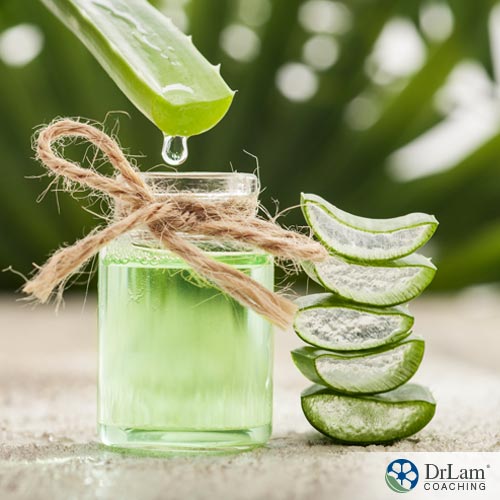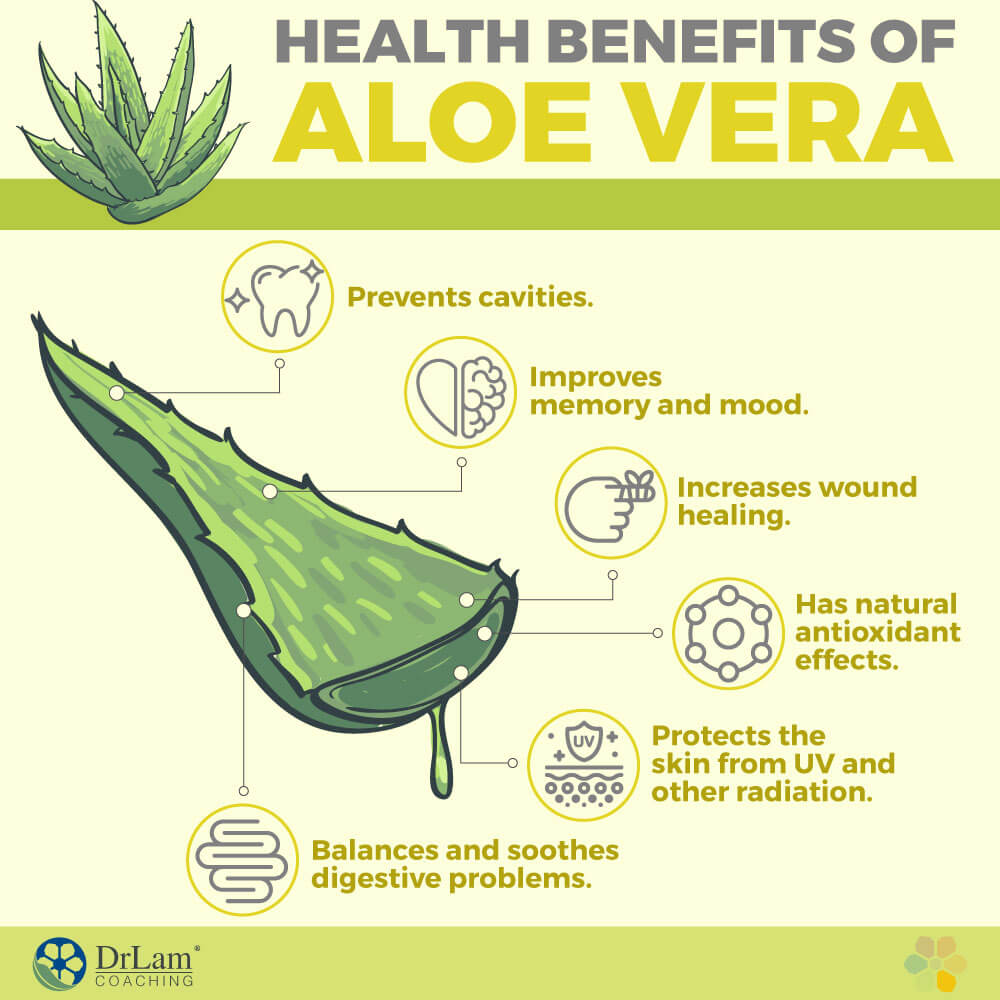 Digestive problems can be a major issue for a lot of people. People with digestive problems often find themselves taking harsh medications that have unfortunate side effects. However, there’s a safer and more natural way to address these types of problems. Aloe vera juice can help to soothe the gut and will also benefit your health in other ways as well. So if you suffer from digestive problems on their own or as the result of disorders such as Adrenal Fatigue Syndrome (AFS), it could be time to try aloe vera.
Digestive problems can be a major issue for a lot of people. People with digestive problems often find themselves taking harsh medications that have unfortunate side effects. However, there’s a safer and more natural way to address these types of problems. Aloe vera juice can help to soothe the gut and will also benefit your health in other ways as well. So if you suffer from digestive problems on their own or as the result of disorders such as Adrenal Fatigue Syndrome (AFS), it could be time to try aloe vera.
Aloe vera has been used as a medicinal plant for thousands of years and is still a popular remedy today for issues like sunburn and other skin conditions. However, it’s only recently that medical studies have been performed to test how well it actually works for specific health complaints. It’s also good for your health overall because it’s extremely nutrient rich and contains minerals such as calcium, potassium, zinc, magnesium, manganese, and copper as well as vitamins A, B, C, and E.
Although aloe vera is usually thought of in connection with skincare, there are other uses for it as well including cosmetics, use in food as a flavoring, as an ingredient in supplements, and as a common herbal remedy.
Aloe vera has a number of health benefits including:

If you have problems with your gut health, you will not only experience pain, discomfort, and reduced quality of life. It will also lower your energy levels, impede nutrient uptake, create detoxification problems, and cause problems with your bowel movements. This will affect the health of your body overall. Your gut and brain are closely linked, so any problems with your gut health will also affect your emotional and mental health as well. That’s why it’s so important that you know about safe and non-toxic ways to repair your gut health such as by drinking aloe vera juice. These types of natural strategies are even more important if you have AFS because this disorder often causes serious problems with the health of your gut as well as sensitivities to more conventional ways of addressing digestive issues.
 Poor gut health and digestive problems are often associated with chronic stress, which can cause imbalances throughout the body. This happens when the constant need for stress hormones results in adrenal gland fatigue. Your adrenal glands are an essential part of your NeuroEndoMetabolic (NEM) stress response, a mechanism in your body that causes changes in your body when you experience stress. The activation of the adrenal glands is the first step in the NEM stress response because they excrete cortisol, the hormone responsible for making you feel alert and prepared to react in times of stress. The circuits of the NEM describe how your body addresses stress.
Poor gut health and digestive problems are often associated with chronic stress, which can cause imbalances throughout the body. This happens when the constant need for stress hormones results in adrenal gland fatigue. Your adrenal glands are an essential part of your NeuroEndoMetabolic (NEM) stress response, a mechanism in your body that causes changes in your body when you experience stress. The activation of the adrenal glands is the first step in the NEM stress response because they excrete cortisol, the hormone responsible for making you feel alert and prepared to react in times of stress. The circuits of the NEM describe how your body addresses stress.
Stress can come in many forms, particularly in the modern world, which often results in chronic stress and the continued activation of the NEM stress response. When this occurs, the ongoing demand for cortisol fatigues the adrenal glands and results in imbalances in the systems directly connected to the adrenals as well as all the systems that are affected by cortisol.
Digestive problems such as constipation, diarrhea, and heartburn are common signs of the early stages of adrenal fatigue caused by increasing toxicity in the body and inflammatory processes. They cause additional stress which can worsen the adrenal fatigue and cause widespread problems in the inflammation circuit and other circuits in the body.
Your gut is a vital part of the inflammation circuit along with the immune system and the microbiome. These three systems typically exist in a state of balance, each of them activating and affecting the others to ensure the overall health of the circuit. However, when you have Adrenal Fatigue Syndrome (AFS), this balance starts to break down. Poor gut health can be a result of this circuit imbalance, or it can cause the imbalance. If you start to suffer from poor gut health, whether as a result of AFS or on its own, it will cause your microbiome or the bacteria in your body to go out of balance, which may result in an overgrowth of bad bacteria. The bad bacterial growth and the gut symptoms will then activate the immune system, sometimes with disastrous results.
The immune system is designed to keep your body healthy by attacking harmful bacteria and other invaders. One of the ways it does this is by creating inflammation in the body to expel the problem. However, inflammation is also triggered because of stress, which can be ongoing and result in chronic inflammation.
Inflammation has been linked to a number of serious health problems such as cancer, heart disease, arthritis, and AFS. If you have AFS, you most likely already have chronic inflammation in your body. Poor gut health and bacterial imbalances will add to that inflammation, further unbalancing the inflammation circuit and worsening AFS. This is a vicious circle of stress, poor health, inflammation, and imbalance, and it can be very difficult to find a way to break free of the resulting problems.
The best way to start your recovery is to reduce your stress levels and find natural, non-toxic ways to re-balance the systems, circuits, and organs in your body. And adding aloe vera to your dietary regime can help, without causing further stress or damage to your body.
 Recovering from gut problems means adopting an eating plan that’s gentle on the stomach, nourishes the entire body, and doesn’t create additional toxicity. Drinking aloe vera will help with all of these because it can improve nutrient absorption and aid with better digestion overall. It also promotes a healthy balance of bacteria in the gut by supporting the growth of probiotics. These are beneficial bacteria that naturally live in the gut and can use aloe vera for nutrition.
Recovering from gut problems means adopting an eating plan that’s gentle on the stomach, nourishes the entire body, and doesn’t create additional toxicity. Drinking aloe vera will help with all of these because it can improve nutrient absorption and aid with better digestion overall. It also promotes a healthy balance of bacteria in the gut by supporting the growth of probiotics. These are beneficial bacteria that naturally live in the gut and can use aloe vera for nutrition.
Aloe vera contains the enzymes amylase and lipase, which help to metabolize sugars, starches, and fats more effectively and keep your gut environment clean, functioning at its best, and balanced. This plant also contains acemannan, which is a polysaccharide known to improve gastrointestinal health. In fact, acemannan is responsible for many of the health benefits of aloe vera, which is why it’s used to help address a range of different problems and disorders.
Aloe vera can also help to balance your pH levels. This is a very effective way to reduce heartburn and help your body to heal any damage caused by the intrusion of acid into places that aren’t made to withstand it. This will also reduce the amount of inflammation in your body.
Aloe vera is available in several forms that are convenient and fairly easy to find these days. Just make sure that you buy one of the organic options to avoid chemicals or pesticides. The first way to take aloe vera is by drinking the juice. Make sure that it’s made from the inner leaf if possible because this is the part of the plant that contains acemannan. If you can’t find a juice that’s made entirely of the inner leaf, try to find products made with the whole leaf. And look for a juice that’s free of aloin, which is a compound found in some varieties of aloe vera that can be hard on the stomach and act as a laxative. Read the labels, because some preparations of aloe have added sugars.
Aloe vera is also available as aloe water. This is made using the same process that produces aloe juice. However, whereas aloe juice is blended with citrus juice, aloe water is made just using water. Taking aloe vera in this form will have exactly the same health benefits and it will help to hydrate you. You can drink it on its own or put it in smoothies with fruit to mask the taste. Aloe water without a sweetener tastes slightly bitter and watery and can be hard to drink on its own.
Another option is to try aloe powder. This is a concentrated form of aloe vera that has the aloin removed. As with the other forms of aloe, make sure that it’s made from the inner part of the leaves or the whole leaf. The powder still has the bitter taste of aloe so it’s usually best when mixed with something else.
Before you add aloe vera to your daily regime, make sure you consult with a trained medical professional. They can help you identify if this plant is right for you and your condition and help you add this plant to your daily intake in a way that will suit your body and your health needs.
Although it’s safe and gentle, aloe can still have negative effects on your body or on your system. Taking too much of this plant can cause blood sugar dips, lower potassium levels in your body, or cause stomach upsets. Also, it is possible to be allergic to aloe vera, though this is fairly rare. So if you notice rashes, swelling or other adverse symptoms after ingesting this plant, then make sure you see a medical professional as soon as possible. And be aware that aloe vera contains a small amount of latex, so if you’re allergic to this, then you will react to the plant as well.
It’s also very important that you’re careful about taking aloe if you have AFS. This syndrome can often cause paradoxical reactions to different substances, which can increase the risk of a bad reaction to this plant. So before you take aloe vera, make sure you talk to a trained professional who is aware of AFS and your own history with it. They will be able to help ensure that you get all of the benefits of this medicinal plant without any nasty side effects.
 If you suffer from digestive problems then you know just how uncomfortable they can be and how much they can affect your health and your quality of life. Unfortunately, harsh medications can sometimes cover the symptoms but not address the underlying cause. Taking aloe vera juice regularly could help soothe your pain and discomfort, and it could also help to improve the overall health of your gut and address the underlying problems. And this is the best way to achieve better digestive health and freedom from unpleasant symptoms.
If you suffer from digestive problems then you know just how uncomfortable they can be and how much they can affect your health and your quality of life. Unfortunately, harsh medications can sometimes cover the symptoms but not address the underlying cause. Taking aloe vera juice regularly could help soothe your pain and discomfort, and it could also help to improve the overall health of your gut and address the underlying problems. And this is the best way to achieve better digestive health and freedom from unpleasant symptoms.
Aloe vera isn’t just for sunburns and injuries, it can also be taken internally to help with a number of health problems. A small amount of the juice from this plant can reduce heartburn and help to balance your digestive system.
